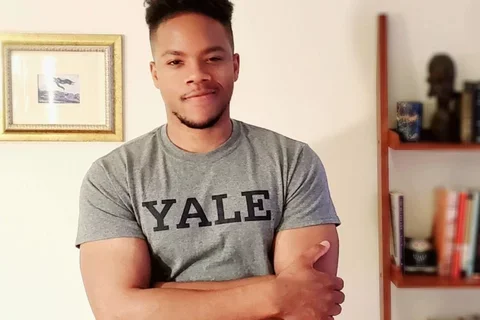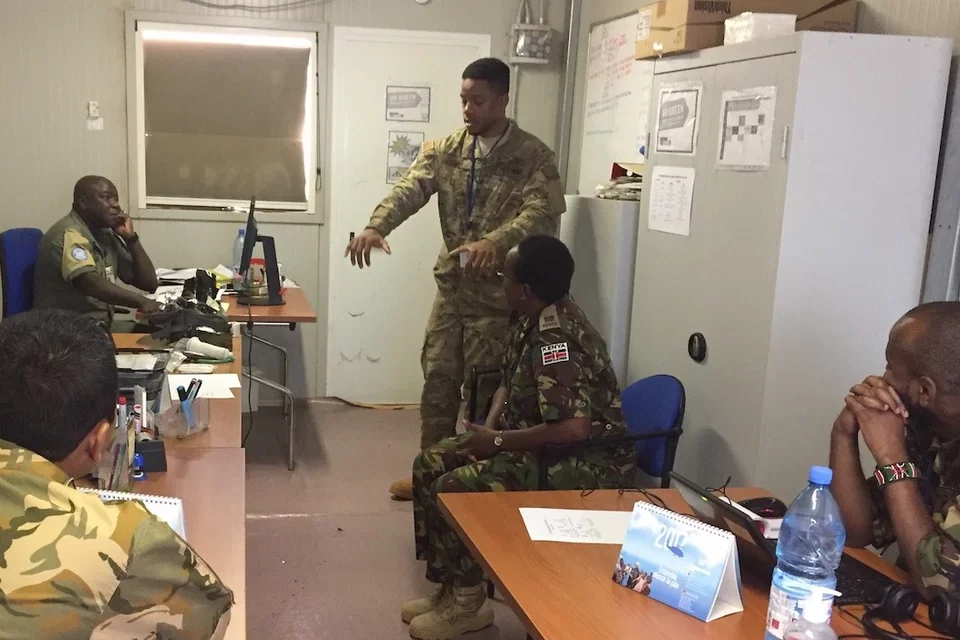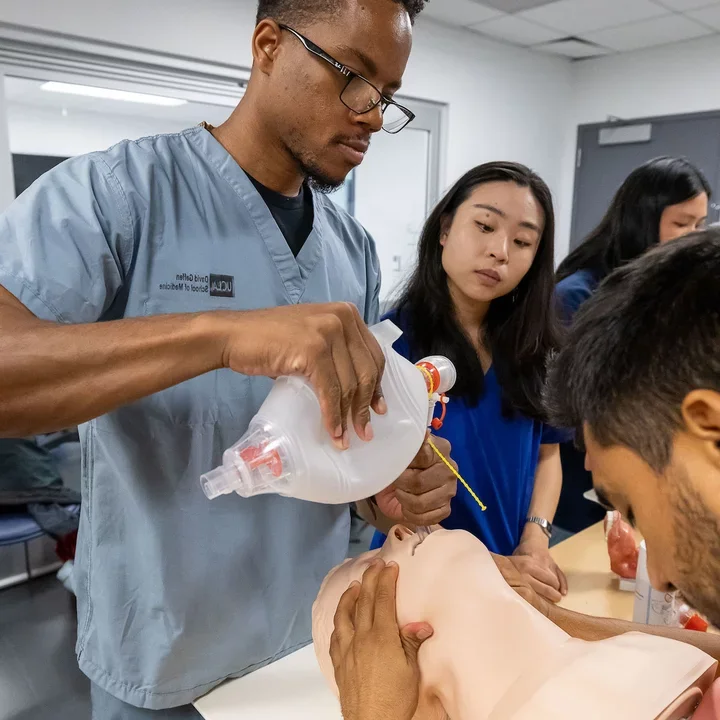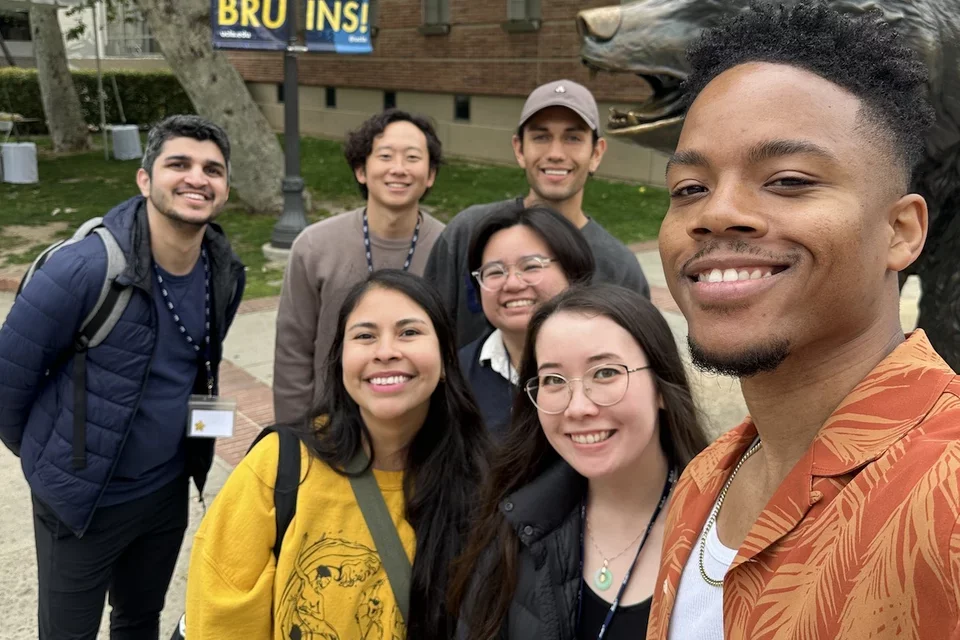The Foster Kid Who Became a Hospital Corpsman
After a troubling childhood, Laz Curry found purpose in the Navy. Now he’s becoming a doctor.

Meet Laz Curry
"Med school for me wasn't even a thought when I was a child or in high school or anything like that. For me, high school was about survival."
Laz Curry's capacity for healing grew out of a difficult childhood. He and his 14 siblings lived in 14 foster homes before being adopted. They suffered trauma after trauma—malnourishment, violence, and abuse in multiple forms.
Throughout these challenges, Laz found purpose in protecting and nurturing his younger siblings. He stepped in to fill their needs, whether that meant defending them at school or making sure they had something to eat at home.
Looking back on his path to medical school, Laz says embracing the role of protector early in childhood helped him develop into a true leader when he joined the United States Navy.
The Protective Big Brother Becomes a Military Leader
"I didn't know I was going to be in the medical field. They just gave me that position and told me to go be good at it."
The year leading up to high-school graduation made Laz nervous. While his peers looked at colleges and planned celebrations, he had to figure out how to support himself.
"My adoptive mother made it clear that I would have to make arrangements for myself after graduating," Laz says. "I was in a constant state of fear about my prospects until I received a U.S. Navy advertisement."
He met with recruiters who promised everything he needed and wanted—a home, independence, and a chance to see the world. Enlisting seemed like a no brainer.
His nerves didn't set in until after he'd completed boot camp and started Hospital Corpsman School. Signing up to be a Hospital Corpsman had been his recruiters' choice—not his. He had no idea how he'd do in the role, but his instructors made it crystal-clear that other people depended on him doing well.
"Our instructors stressed the proud history of being the highest-decorated corps in the Navy and that our mistakes could end lives. I immediately felt the weight of that history and those expectations."
Now, Laz feels grateful for that high-pressure role. His military experience pushed him to become a leader and to grow beyond his childhood struggles.
"The military helped me bridge the gap between being a protector and nurturer to being a leader who can engage with people."
The military would also show him he had what it took to pursue a career in medicine.

From Mali to Medical School
In the military, Laz met countless individuals who helped him find his way to becoming a doctor. Commander Agnes Ambrosi played an especially significant role.
When Laz was stationed in Spain, Commander Ambrosi taught him how to perform ear, nose, and throat (ENT), muscolo-skeletal, and other medical exams.
"The experience instilled in me the importance of patient-centered care and was the catalyst for my desire to practice medicine."
Commander Ambrosi also connected Laz with the United Nations Multidimensional Integrated Stabilization Mission in Mali, Africa (MINUSMA), a major turning point in his career.
Through the mission, Laz trained members of an international team on emergency and combat care.
"So many lives were unnecessarily lost due to a lack of knowledge of tourniquets and other medical equipment," Laz says. "It was inspiring to be able to pass on the knowledge I'd learned over the years and build relations with foreign troops through medicine."
The mission helped Laz see his own potential. After spending eight months in Mali, he decided to go back to school and become a doctor.
Going Back to School for Medicine and Social Justice
"Going back to school after 10 years and starting undergrad was very daunting, so the fact that I'm here now—it's an amazing feeling."

Laz attended night school at a community college while still on active duty. After earning his associate's degree in science summa cum laude, he headed to the Ivy League.
He graduated from Yale in 2024 with a degree in the History of Science, Medicine, and Public Health. The curriculum centered on Los Angeles, specifically how racial, social, and healthcare structures have historically contributed to the poor health of some residents.
Laz's knowledge of Los Angeles and its healthcare system helped him stand out while interviewing for the Urban Health Equity Pathway (UHEP) at the David Geffen School of Medicine at UCLA (DGSOM).
UHEP, in turn, helped UCLA stand out from other med schools Laz considered. He'd always seen medicine as something that should reach beyond a clinic's walls.
"For me, social justice is medicine."
Now, as a UHEP student, Laz feels like a pillar of the Los Angeles community, someone who serves as a wealth of knowledge and resources for people who may need services a doctor can't traditionally prescribe.
A Medical Career Built on Strong Relationships
Laz hopes to specialize in emergency medicine so he can bring his expertise back to the community he feels most connected to: patients who count on emergency services as their primary mode of care.
"I wasn't raised in just one place, so I don't really come from just one community," Laz explains. "But those patients remind me of people I've interacted with in different communities throughout my life."
Laz has seen how society sometimes belittles and blames these people for needing to use emergency care beyond what most consider an 'emergency capacity.'
He wants to uplift them. He feels grateful to have had opportunities for growth and upward mobility so many others can only dream of.
"Because I got out, I want to help the people who supported me and got me to this point," he says. "I didn't get here by myself."

"I have 14 brothers and sisters, so it is surprising, even to me, that I'm the first to attend college. Getting into med school was that light at the end of the tunnel."
Considering how his siblings ended up on trajectories so much different from his own, Laz appreciates the impact receiving and offering support can have.
"This is my chance to refrain from perpetuating a cycle that so many kids with similar backgrounds fall prey to," he says. "I'm eager to help people and become a change agent for underserved communities."
There's another powerful relationship Laz knows he must thank for getting him where he is today: the relationship he has with himself.
His determination, openness, and willingness to make bold choices shaped the life he has today.
"I chose to do my research about the military," he says. "I chose to call a recruiter. I chose to enlist."
Laz's story offers a guiding light to those who've experienced trauma and other challenges, to those who doubt their own abilities and potential. While the past cannot be changed, the future is a choice they should feel empowered to make for themselves.
"I refuse to be a victim of my past. Instead, I strive every day to be a success story."



